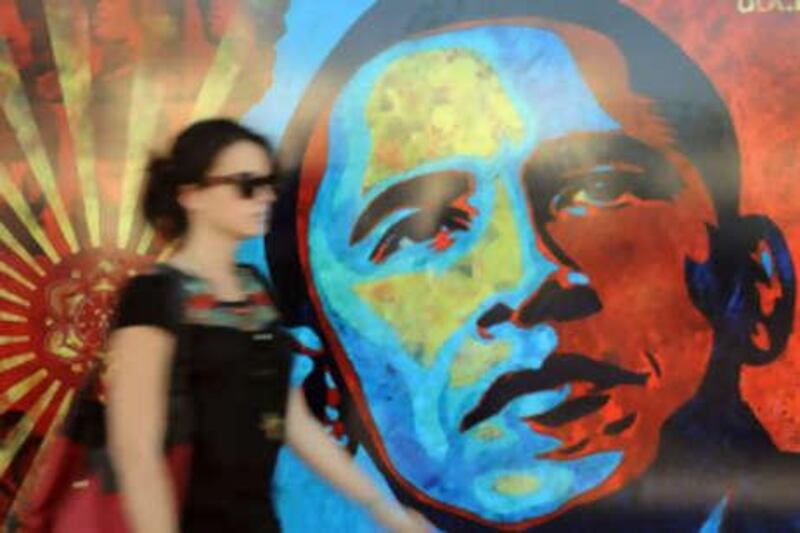CHICAGO // His supporters donned goofy Uncle Sam hats and clutched stuffed Democratic donkeys, honked their car horns and hugged, waved American flags and wept as openly as they cheered, watching history write itself before them. "We did it, baby!" was one cry heard on the streets of this jubilant city - and probably others - after Barack Obama delivered his victory speech on Tuesday night.
But something remarkable happened the day after the US elected its first African-American president: life just went on. In some ways America woke up on Wednesday a different place, a country long burdened by the weight of its own racial injustices that had finally taken an outsize step towards reconciliation. John McCain, the Republican senator from Arizona who was soundly defeated by Mr Obama, addressed the historical significance of his opponent's election in his concession speech, saying "we have come a long way from the old injustices that stained our nation's reputation and denied some Americans the full blessings of American citizenship".
But in another way the country woke up after election day much the same, prepared - despite partisan differences brought out by the campaign and the disappointment of the losing side - to transfer power peacefully from one man to the next, as it does every four or eight years. And that seemed part of the victory, too. Mr McCain asked his supporters - some of whom booed - to stand behind Mr Obama, as he said he now would, to bridge the country's differences and get it moving again. And Mr Obama asked for the help of all those who did not support him, but whose voices he said he had heard.
"I know he's got a tough job ahead of him," said Char Perlow, 65, white and retired, who attended Mr Obama's election night rally with her daughter and sister, an array of political buttons pinned to her chest. "Hopefully he'll be able to bring us all together." "This is the one chance for the United States of America to come together as one," said Paris Jones, 34, an African-American telephone technician whose T-shirt displayed Mr Obama's face on the front and the words "History In The Making" on the back. "We're all as one. We're Americans before we're anything." The hard work of preparing to govern - harder even than the 21-month campaign Mr Obama waged to earn the right to - begins now. Mr Obama, a first-term senator from Illinois, is facing the most difficult transition at least since 1932, when Franklin D Roosevelt took office during the Great Depression. He moved quickly to name the three advisers who will co-chair his transition team, including John Podesta, a former top aide to Bill Clinton, and appointed as his chief of staff Rahm Emanuel, another Clinton White House veteran and Illinois congressman who is a member of the Democratic leadership team on Capitol Hill. Mr Obama is expected to name other close White House advisers and his economic team soon, with other key cabinet selections not far behind. Early in his administration Mr Obama is likely to face weighty decisions on a host of issues, including an economic stimulus package and other measures to jump-start the economy; troop levels and strategy in Afghanistan and Iraq; reform of the health care system; and the fate of the detention centre at Guantanamo Bay. The expectations are as high as they could be, leaving plenty of room for disappointment, or at least "setbacks and false starts", as Mr Obama said on Tuesday night. Chicago continued to celebrate Mr Obama's historic win, though in somewhat quieter ways; the streetposts surrounding all four sides of the city hall building downtown were decorated with colourful signs congratulating Chicago's hometown hero, and some people sported buttons declaring "I Was There", referring to the rally at Grant Park. The Chicago Reader, a free weekly newspaper, marked Mr Obama's election with a drawing of him on its cover and this advice: "Don't Screw This Up." As for the president-elect, he reportedly worked out on Wednesday morning, as is his daily custom, then spent several hours on the telephone and in meetings on staffing and other transition matters. But elsewhere in the city, a day after the US elected its first African-American president, life just went on. Mr Jones, the telephone technician, is still scheduled to be laid off from his job today. And Fahid Khamo, 38, an Iraqi who has been in America for nearly three decades and is himself out of work, still expects to hear soon from family in Baghdad, as he does from time to time, asking him and his mother to send money. Mr Khamo had a dream not long before election day that Mr Obama - for whom he would have voted were he a citizen - prevailed and that the country became a better a place. "I believe that Obama's going to make a big difference," Mr Khamo said. "He knows how. I think he's been through what a lot of people have been through and he knows how hard it is people are feeling right now. It's not just America, it's everywhere." eniedowski@thenational.ae






